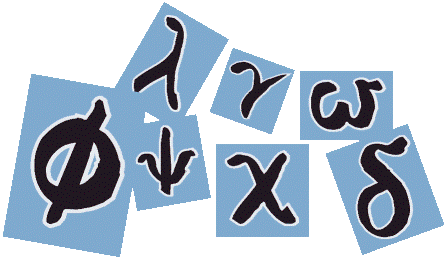|
restoring our biblical and constitutional foundations
|
Greek Student: Quo Vadis?
In one week the semester will end. Exams will be over, but questions will remain. How will you fare, Greek student? It all depends on your “maturity.”
The Greek term for maturity is teleios. It can
refer to physical maturity, spiritual maturity, and even mental maturity.
Pythagoras, the ancient Greek mathematician, said he had two kinds of
disciples: those
 whom he called “babies” (nepioi), and those whom
he called “mature” (teleioi). The mature students not only had a mastery of
the rudimentary elements of the subject; unlike the babies, they also went
on to put their knowledge to good use. May I ask, “What kind of a student
are you?”
whom he called “babies” (nepioi), and those whom
he called “mature” (teleioi). The mature students not only had a mastery of
the rudimentary elements of the subject; unlike the babies, they also went
on to put their knowledge to good use. May I ask, “What kind of a student
are you?”
The baby Greek student rejoices that the semester is over and a good grade has been earned; he is pleased as pudding to have two semesters of Greek on his transcript; but he has forgotten the vocabulary he once memorized for quiz purposes; and he has neglected his paradigms and principal parts. The mature student is not content to remain at the elementary stage of instruction. He not only reviews what he has already learned, he applies it to the reading and study of his Greek New Testament. Knowledge is important to him; but even more important is the application of that knowledge.
I have students who have received “A”s in elementary Greek but who never open their Greek New Testaments. They fail to receive the real riches of their studies. Their unflagging effort to get a good grade has dissipated, and all is soon lost and forgotten. A year or two later, when I ask them how their Greek is doing, they admit to still being babies and no nearer to maturity than when they began their studies.
It is one of the great tragedies of the church that
so few pastors who have taken Greek in seminary are able to apply that
knowledge in any significant way. It often happens that we defeat
ourselves by starting out well on milk but never going on to meat.
Arrested development is no less a disaster in one’s intellectual life as
in one’s spiritual life. Five years from now will we still be using our
knowledge of Greek properly? Two years from now? I am not implying that we
will reach complete knowledge or
 complete maturity. But if we fail to
“leave the elementary teachings” behind and allow the Holy Spirit to
“carry us on to maturity” (Heb. 6:1), I cannot see how God can be very
pleased with us.
complete maturity. But if we fail to
“leave the elementary teachings” behind and allow the Holy Spirit to
“carry us on to maturity” (Heb. 6:1), I cannot see how God can be very
pleased with us.
What to do then? Read a few verses of Greek every day. Do your devotions in the language. Take your Greek New Testament with you to church and chapel. Take a course in intermediate grammar. Acquire and maintain a good working vocabulary. It is true that all these tasks are difficult. It is true that our lethargy and laziness will often get in the way. But as a Greek teacher I must tell you that one of the saddest sights is that of a solid foundation wasted because the student has refused to build a superstructure on it.
Will that happen to you? The choice is yours.
May 14, 2007
David Alan Black is the editor of www.daveblackonline.com.